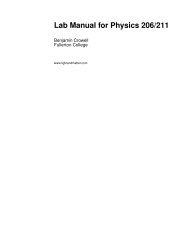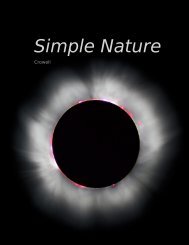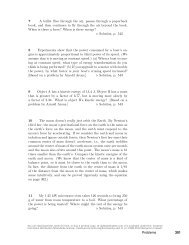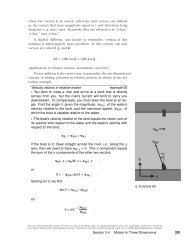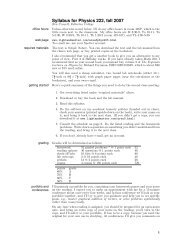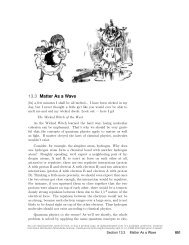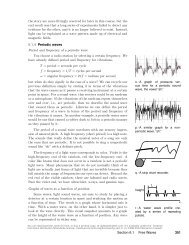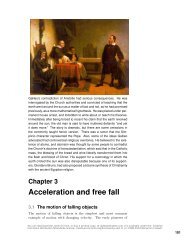Chapter 1 Conservation of Mass - Light and Matter
Chapter 1 Conservation of Mass - Light and Matter
Chapter 1 Conservation of Mass - Light and Matter
You also want an ePaper? Increase the reach of your titles
YUMPU automatically turns print PDFs into web optimized ePapers that Google loves.
c / Left: In a frame <strong>of</strong> reference<br />
that speeds up with the truck, the<br />
bowling ball appears to change<br />
its state <strong>of</strong> motion for no reason.<br />
Right: In an inertial frame <strong>of</strong> reference,<br />
which the surface <strong>of</strong> the<br />
earth approximately is, the bowling<br />
ball st<strong>and</strong>s still, which makes<br />
sense because there is nothing<br />
that would cause it to change its<br />
state <strong>of</strong> motion.<br />
64 <strong>Chapter</strong> 1 <strong>Conservation</strong> <strong>of</strong> <strong>Mass</strong><br />
The principle <strong>of</strong> Galilean relativity states that inertial frames<br />
exist, <strong>and</strong> that the same laws <strong>of</strong> physics apply in all inertial frames<br />
<strong>of</strong> reference, regardless <strong>of</strong> one frame’s straight-line, constant-speed<br />
motion relative to another. 4<br />
Another way <strong>of</strong> putting it is that all inertial frames are created<br />
equal. We can say whether one inertial frame is in motion or at rest<br />
relative to another, but there is no privileged “rest frame.” There<br />
is no experiment that comes out any different in laboratories in<br />
different inertial frames, so there is no experiment that could tell us<br />
which inertial frame is really, truly at rest.<br />
The speed <strong>of</strong> sound example 3<br />
⊲ The speed <strong>of</strong> sound in air is only 340 m/s, so unless you live<br />
at a near-polar latitude, you’re moving at greater than the speed<br />
<strong>of</strong> sound right now due to the Earth’s rotation. In that case, why<br />
don’t we experience exciting phenomena like sonic booms all the<br />
time? ⊲ It might seem as though you’re unprepared to deal with<br />
this question right now, since the only law <strong>of</strong> physics you know<br />
is conservation <strong>of</strong> mass, <strong>and</strong> conservation <strong>of</strong> mass doesn’t tell<br />
you anything obviously useful about the speed <strong>of</strong> sound or sonic<br />
booms. Galilean relativity, however, is a blanket statement about<br />
all the laws <strong>of</strong> physics, so in a situation like this, it may let you<br />
predict the results <strong>of</strong> the laws <strong>of</strong> physics without actually knowing<br />
what all the laws are! If the laws <strong>of</strong> physics predict a certain value<br />
for the speed <strong>of</strong> sound, then they had better predict the speed<br />
<strong>of</strong> the sound relative to the air, not their speed relative to some<br />
4 The principle <strong>of</strong> Galilean relativity is extended on page 189.



